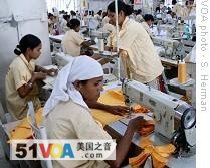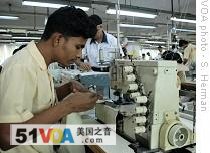New Delhi
23 February 2009
A United Nations agency is offering what it calls a "conceptual breakthrough" to uplift the world's poorest people. The U.N. Industrial Development Organization contends selective industrialization offers the best chance for smaller, developing countries to achieve sustainable economic progress. But the backers of the plan acknowledge the global economic crisis will make needed investment difficult to attract.
Choosing the right products to make for the global market is key, if low-income and slow-growing countries want to break free of the poverty trap. That is the critical point in the 2009 Industrial Development Report of the United Nations Industrial Development Organization.
 |
| Workers at a Babylon Group garment factory in Dhaka |
The U.N. agency says such changes would benefit what it terms the "bottom billion" - the people who are subsisting on less than one dollar a day.
But the UNIDO's South Asia representative, Philippe Scholtes, acknowledges the gloomy international economic situation will make it more difficult, in the next five to 10 years, for underdeveloped countries to realize value-creating manufacturing hubs.
"The global crisis will certainly have an impact for these bottom billion," Scholtes said. "The emphasis on building up physical infrastructures, human infrastructures and developing technological capabilities may be put somewhat aside."
 |
| A man at an industrial sewing machine in the Babylon Group's garment factory in Dhaka |
The U.N. report notes India's rapid export growth in the first half of the decade made South Asia the fastest growing region in manufactured exports, following by the Middle East and North Africa.
The report was released Monday in New Delhi, London and other cities. The UNIDO, headquartered in Vienna, is a specialized United Nations agency mandated to promote industrial development and international industrial cooperation.